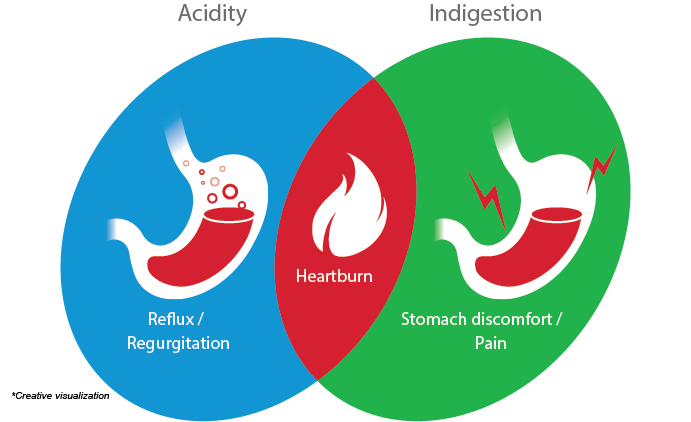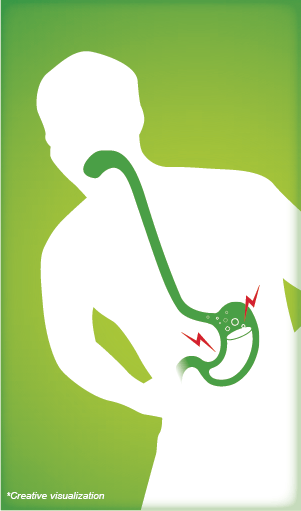Acidity and indigestion can be hard to tell apart. Some of the symptoms are the same for each of them and what’s more, some people actually have both acidity and indigestion!
It’s no wonder a lot of people are unsure whether they have one or the other… or both… or perhaps something else. Don’t worry, we’re here to help clear up any confusion.
Knowing whether you have acidity problems or indigestion can help make sure that you get relief from your symptoms, so read on!
Are acidity and indigestion related?
The short answer to this question is ‘yes’.1,2,3 There is certainly a lot of overlap between the symptoms of acidity and indigestion, and there is also overlap between many of the causes and triggers.1,2,3
One of the defining symptoms of acidity problems is heartburn, which is a burning sensation in the centre of the chest.1,2 Heartburn can also be a symptom of indigestion.1,2
Overlap of symptoms in acidity and indigestion1,2

If you’d like to know more about acidity problems and heartburn, click here.
Doctors are still doing studies to try and work out whether people who have indigestion and heartburn should have different treatments to people who have indigestion without heartburn.1,2
In the meantime, treatment, which includes changes to diet and lifestyle as well as medications, should be based on the predominant symptoms.1,2,3
However, Eno complements your body’s self defence mechanism to fight acid indigestion and associated symptoms such as heartburn or sour stomach which may cause an upset stomach
What is indigestion and what causes it?
Picture this. You’ve just had your favourite meal for dinner and you’re relaxing with your family, when all of a sudden you get a slightly painful, uncomfortable feeling in your stomach. What had been an enjoyable evening turns into a long night.
Unfortunately, this scenario is all too common. There’s a good chance it’s caused by indigestion, but it doesn’t have to keep being this way. We can help you work out what might be triggering your symptoms, so you can know how to prevent them.
Indigestion, which in medical circles is called dyspepsia, is a general term to describe pain or discomfort in your stomach area.1,4 It’s not a disease or condition as such – it’s just a way to describe the symptoms you experience.1,4
In most cases, indigestion symptoms appear soon after eating, but they can start at any time. The types of symptoms you get and when you get them can vary from person to person, and some people may get symptoms only occasionally while others get them every day.4
Along with acidity problems, indigestion is one of the most common health complaints. A survey in Brazil showed that around 20% of people have indigestion symptoms at least once a month.5 This is similar to other countries,2 but some estimates suggest indigestion could affect up to 40% of the population.1
While there is no single cause of indigestion, there are many different things that can trigger it.4 Most of these are related to your lifestyle and the things you eat and drink, including:4
Sometimes indigestion is caused by other digestive conditions or diseases, such as gallstones, constipation and Celiac disease.4 If you’re not sure if you have indigestion or not, or your symptoms worry you, it’s best to see your doctor.
What are the main indigestion symptoms?
There are a number of symptoms or combinations of symptoms you can have, and some people may not always have the same ones.1,4 The most common symptoms are:1,4
Feeling full before you’ve finished eating a meal
You might not have eaten very much, but you already feel full and may not
be able to finish eating.
Feeling uncomfortably full after eating a meal
You’ve eaten a normal meal, but you feel uncomfortably full and the feeling of fullness lasts longer than it should.
Having discomfort or pain in the stomach area
You feel a mild to severe pain in your upper abdomen, which is the area between the bottom of your breastbone and your navel.
Having a painful, burning feeling in the chest
You have heartburn or acid reflux, especially after eating a meal.
Feeling a burning sensation in the stomach area
You have an uncomfortable heat or burning sensation in your upper abdomen.
Feeling bloated and uncomfortable
You have an uncomfortable sensation of tightness in your stomach area
due to a build-up of gas. Occasionally you might belch too.
Feeling like you want to be sick
You sometimes feel nauseous, as though you want to vomit. (Of course, nausea and vomiting can be symptoms of many other problems too.)

Where to find out more
There’s no doubt that acidity and indigestion can get in the way of your everyday life. Hopefully we’ve been able to help you understand your symptoms and the best ways to get relief.
If you’d like to know more about some really interesting home remedies for acidity problems, have a look here.


















